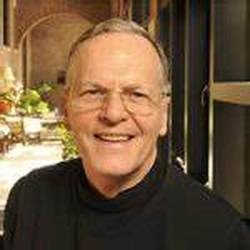
meetingjesusinjohn.org/2018/01/01/week-6-day-1-sent-into-the-world/
| A Prayer Diary |
|
 In the Week 6 Day 1 post of the Society of St. John the Evangelist Lenten post, Br. Curtis suggests that there is a fifth Gospel, the Gospel according to you. What an intriguing idea, one that challenges me to give it a try. As Br. Curtis suggests, it will tell what my life is about. As I begin, the one thing I know for certain is that my Gospel will tell that God has called me to pray for people-- that is definitely a God call because never in a million years could I have thought that up myself. Prayer will be the special message of my Gospel. meetingjesusinjohn.org/2018/01/01/week-6-day-1-sent-into-the-world/
0 Comments
 In today’s Lenten post from SSJE, Br. David asks us to reflect on the following: "How do I stay connected to this source of life and light? What interferes with that connection? What stops the flow of that divine energy and how can I remain in intimate union with Jesus? That connection is the source, the key, the secret, to our fruitfulness.” meetingjesusinjohn.org/2018/01/01/week-5-day-4-made-fruitful-by-love/ One way I stay connected to the source of life and light is by expressing, in concrete terms, gratitude for all the grace-filled moments in my life. I do a pretty good job of this in the morning as I start my day by naming specific things for which I am grateful. But then, as I become immersed in the everydayness of life, I forget God, I forget grace, I forget to be grateful. Saying the Jesus Prayer is one way I reopen the flow of divine energy.  These words from a sermon by Br. Geoffrey Tristram, www.ssje.org are worth pondering as the new year begins. “First, what are the deep truths about yourself that you absolutely know to be true – the bedrock, the deposit, the precious treasure which is most profoundly true – and which you abandon or forget at your own peril? What is at the core of your God given identity? How does God know you? Who did God create when he created you and called you by name? And what do you need to do to guard and protect your truest self in order to live a life that is authentic? “But then, the second question. How can you also be faithful to the Spirit challenging you now to grow? What needs to change? What needs to die so that your truest self may live? We don’t like to die – and we don’t like to change, especially as we grow older. But in Cardinal Newman’s famous words, “to live is to change, and to be perfect is to have changed often.” So where is the Spirit calling you now to change and to grow?” 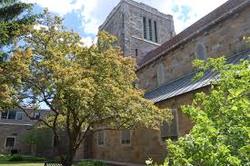 Last Saturday, after a year’s discernment, I was received into the Fellowship of the Society of Saint John the Evangelist in Cambridge. The Society, with members all over the globe, is rather unique in that its members make no physical commitments. There are no annual dues or meetings. We agree, however, “to seek to live an ordered life of prayer and service in association with the Society, and follow a Rule of Life which expresses a common commitment to faithful discipleship.” I prayed before making this final commitment. It would have be easy to say yes without paying attention to details. After all, who would know? God would know, and God will know if I remain active, or if I slack off. I felt called to make this public commitment; to put it more bluntly, I needed to make it. It is an answer to my prayer that Jesus enter my life more fully, and lead me to be His servant. I need to be connected to others trying to live for God’s kingdom, not for their own self. 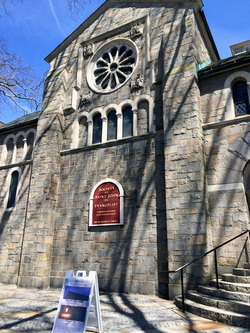 Yesterday I attended a workshop on contemplative prayer (synonymous with centering prayer) at the Society of St. John the Evangelist in Cambridge. About forty of us sat in a circle in the general purpose room of the undercroft of the monastery listening to Br. Robert and practicing letting go of thoughts as we felt our the breath. It is simple as that. And yet, how hard it is to expand that space between thoughts! Br. Robert opened the session reading Mark 6:1-6. Jesus is at his hometown synagogue, teaching but not praying. He prays when he goes off by himself, which is a model he has given us for contemplative prayer, Here are a few nuggets gleaned the workshop. • Prayers is about relationship with God. • The purpose of contemplative prayer (and life) is union with the Divine. • Develop a daily routine for contemplative prayer and follow it. If on a given day you don’t want to, do it anyway. Give up all excuses. • Br. Robert’s first thought when he wakes up in the morning is about coffee, not God.  I thought I’d share my response to the latest question from the ‘Growing a Rule of Life’ Lenten series of the Society of St. John the Evangelist (www.ssje.org) in Cambridge, Massachusetts. How would you describe your unique ‘vocation’ in the world? My unique vocation in the world is to pray for people. I use the phrase to pray for people rather than to be an intercessor because it feels more like what I do. I don’t pray for specific outcomes; I pray that God will enter the person’s heart and guide them in the peace they long for. I pray Thy will be done, not that God will do what we humans want. I continue to be in awe of this vocation. I know and have come to believe that it is a call from God, because NO WAY would I have every thought it up myself or followed through with it on my own. The following wasn’t part of my public response on the SSJE site but it will help clarify. When someone puts for a specific prayer request, it usually aligns with God’s will. For example, recently a friend asked for prayers that the school make appropriate changes to her son’s educational plan. I pray Thy will be done as I visualize God in the situation. That’s the best I can do to put it into words. 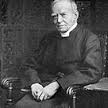 Richard Meux Benson was the founding brother of the Society of St. John the Evangelist in Cambridge, Massachusetts. In a recent sermon Br. Curtis Almquist in talking about intercessory prayer, quoted Benson, “In praying for others we learn really and truly to love them. As we approach God on their behalf we carry the thought of them into the very being of eternal Love, and as we go into the being of him who is eternal Love, so we learn to love whatever we take with us there.” This approach removes any judgment I might have about how God ‘should’ respond to my prayer, or any thought that I might take on the role of God. Br. Curtis goes on to say, “It is a tall order, to pray in such a way, but it is co-operating with what Jesus gave his life, praying for one another on earth as it shall be in heaven. Pray for your enemies. Bless, do not curse them. Pray for your enemies. If you were to ask, where to start? Start with three. Pray for three enemies. How long? Pray until you begin to sense the ice melting in your soul, the beginning of the flow of compassion. Keep it up. Love will come. Love will surely come.” Who are my enemies? I don’t have big time enemies, but I do have people who annoy me and get in my way, people of whom I’m jealous. They are my enemies because they come between me and God. I will start with three. 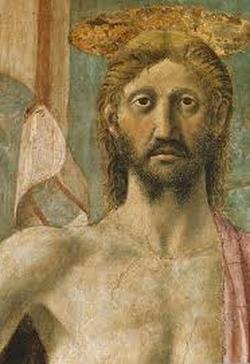 At the funeral service on October 17, 2014 for Thomas Shaw (Brother of the Society of St. John the Evangelist and Bishop of the Boston Diocese of the Episcopal Church), Br. Geoffrey Tristram spoke of Shaw’s favorite painting, the ‘Resurrection’ by Piero della Francesca. “In pride of place, right in the center, and covered with candle wax drippings was this painting, which he was praying with during his last days. It was one he loved and preached about and led a meditation on at Convention.” Tristram went on to remind us that for Shaw it was Christ’s eyes. “The glory is Christ’s eyes. They gaze at us, steadily and lovingly. But they are eyes which have gone through the night: for 3 days they have been wrestling with death – but have finally conquered.” Piero della Francesca is one of the most compelling painters of early Italian Renaissance, and definitely my favorite. I feel an affinity with Shaw because I have the Resurrection painting hanging in my the angel room; I have a postcard of Christ’s head with those eyes staring at me, those eyes that penetrate right into my soul. If I’m not truthful those eyes know, and I find myself turning away from them. http://ssje.org/ssje/2014/11/01/funeral-service-m-thomas-shaw-ssje-br-geoffrey-tristram/ 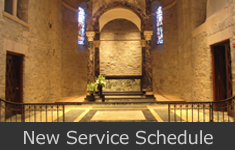 If you live in the Boston area or are visiting Cambridge on a Wednesday, I suggest that you stop in and attend the Service of Holy Eucharist at 12:30* at the Society of Saint John the Evangelist. My friend and I found a parking spot (free from 9-4) right in front of the chapel on Memorial Drive. After the service, lunch at Legal Sea Foods. But the heart of the matter lay in praying with the brothers and other visitors like us, and in sharing communion around the altar. Thank you brothers for the hospitality. (*It that time doesn’t fit your schedule, check out other services at www.ssje.org.) 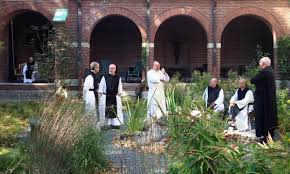 Recently the following was posted on the web site of The Society of St. John the Evangelist. It was part of a sermon given by Br. Eldridge Pendleton on February 11, 2007. It spoke to me and I trust it speaks to you. I offer no more comment that that. “I doubt there is anyone here this morning who does not recognize the critical importance of one’s relationship with God or know that to keep the friendship honest, healthy and fruitful we have to maintain contact, we need honest prayer lives. But it is one thing to know this intellectually and quite another to put it in practice each day. Robert Wicks, a leading psychotherapist and spiritual director, who has worked with literally thousands of priests, ministers, monks, religious sisters and others in Christian ministry to teach them ways to avoid stress and emotional burnout reports that a majority of those he has interviewed do not have honest prayer lives even though they are supposed to be women and men of prayer whose work is grounded in prayer. This is startling news, but is it really surprising? Look at your own life. You may desire a life grounded in prayer and a close relationship with God. You may even dedicate a space in your home for silence and solitude where you can go and pray undisturbed by domestic hubbub. And yet, in any given week how often do you go there to pray, to sit in silence, to offer up your concerns or ask God for help? When the pace and demand of daily life increases often the first casualty is one’s prayer life. Wicks discovered that even in situations where major life decisions had to be made those in ministry did not often pray for discernment and direction. Ask yourself, when you are facing those big questions and have critical decisions to make do you seek God’s help or do you forge forward as though it all depended on you? Be honest with yourself. What is you standard practice? http://ssje.org/ssje/2007/02/11/an-urge-to-hug-sycamores/ |
Contact me
[email protected] Archives
August 2023
Categories
All
|